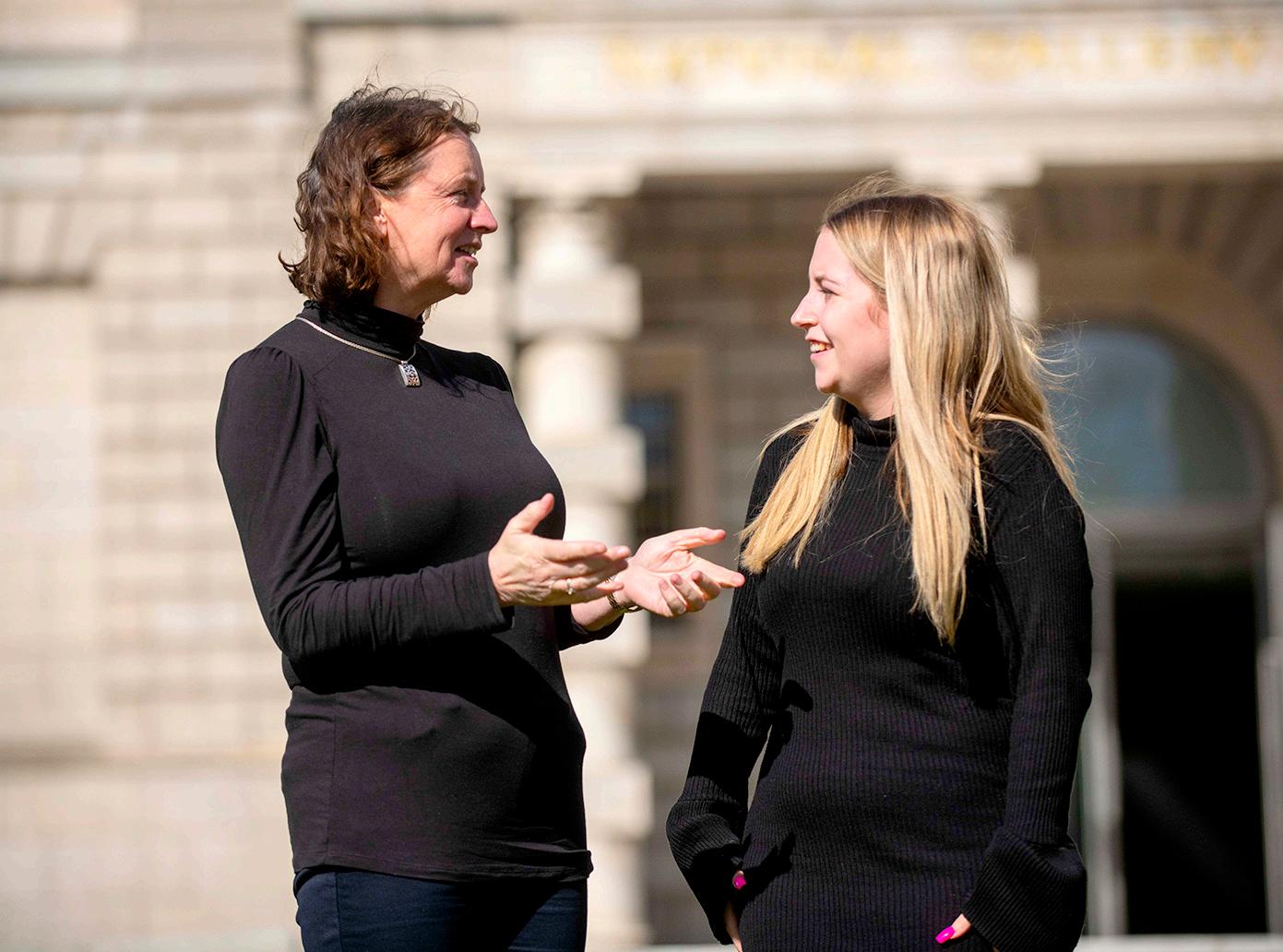
8 minute read
Accounting apprenticeship option opens a gallery of opportunities
Apprenticeship option opens a gallery of opportunities
Advertisement
THE wonderful environs of Dublin’s National Gallery have become the workplace of an accountancy apprentice thanks to a programme which allows students earn while they learn.
The gallery houses an amazing collection of European art spanning the 14th to the 20th-century.
And now it’s the place of work of Katie Haverty, who has recently finished her first year of the Accounting Technicians Ireland (ATI) programme.
Supportive Student Katie (20), from Finglas started with the ATI apprentic eship after becoming disillusioned with a full-time college course, joining nine finance staff at the Gallery.
“I began an arts degree, but there was only 12 hours of study across the whole week and I had to travel to the college for only one hour a day,” she said.
“I deferred the course for a year and began working as a pay role clerk, which I loved, so I when I saw the apprenticeship course online I
42 Education liked everything it offered.
“The tutors and my employers are so supportive and you get 15 days study leave a year for exams.
“If you were in full-time study and had a part-time job, you wouldn’t get that. This course really takes the stress out of studying while working. “There’s nothing else like it and I’ve already recommended it to my friends.”
Work-based learning The Accounting Technician Apprenticeship is a funded, workbased learning programme in which locally-placed apprentices earn at least €19,000 a year and it has created 160 jobs.
Head of Finance at the National Gallery of Ireland, Mary Leane, has described the concept as fantastic, with quality of training second to none.
“I’ve always had a lot of time for accounting technicians, but this course is a step ahead of the rest,” said Mary.
“I’ve often come across graduates who aren’t able to put theory into "The tutors and my employers are so supportive and you get 15 days study leave a year for exams" practice after they qualified.
“But this course enables the student to apply what they have learned straight away, which makes the academic side easier for them.
“The balance between theory and practice is brilliant.
“Classes are small and the college monitors both the student’s work and checks on the employer also.
“I would highly recommend the course to any employer, especially as there are no recruitment or course fees involved.”
Applications for the apprenticeships, which will be based in Dublin, Wicklow, Cork, Waterford, Limerick, Galway and Monaghan are now open.
Leaving Cert students and mature learners can apply for the programme through Accounting Technicians Ireland.
A real alternative This apprenticeship provides a real alternative for Leaving Certificate students who prefer practical training to a full-time college programme, or f o r s t u d e n t s w h o m a y h a v e
Head of Finance at the National Gallery of Ireland, Mary Leane (l) and Katie Haverty, who has recently finished her first year of the Accounting Technicians Ireland (ATI) programme at the Gallery. Pic: Fintan Clarke

FIND OUT MORE: Visit www.accountingtechniciansireland.ie and select Apprenticeship study option. "This apprenticeship provides a real alternative for Leaving Certificate students who prefer practical training to a full-time college programme" embarked on a college course and found that it didn’t suit them.
It is also an attractive option for existing employees and mature learners who would like to pursue a career in accounting.
Large accountancy firms such as Grant Thornton, smaller high street practices as well as organisations in industry and the public sector have embraced the new apprenticeship programme.
Their apprentices work in the office four days a week and study in a local college one day a week during the two-year programme, which begins in September. Progress on Successful graduates of the apprenticeship programme may then progress on to full Accountancy with Chartered Accountants Ireland or one of the other professional accountancy bodies. The practical nature of the programme, the salary and also the fully-funded fees really make the A c c o u n t i n g T e c h n i c i a n Apprenticeship particularly appealing to School Leavers who prefer learning by experience and work to full-time college education, according to Gillian Doherty, Chief Operations Officer at Accounting Technicians Ireland.
In-demand accountancy “When students complete the apprenticeship programme, they will have a strong, in-demand accountancy QQI Level 6 award, two years of solid work experience and the opportunity, if they wish, to progress to further study across accountancy, business or finance,” said Ms Doherty.
“This is a pan-sectoral programme which meets the needs of industry, practice and the public sector, and graduates enjoy exemptions from the full range of professional accountancy bodies including Chartered Accountants Ireland, CPA, ACCA and CIMA.”
Accounting Technicians Ireland ATI is the leading professional body for Accounting Technicians on the island of Ireland. We educate, support and represent over 10,000 people working in the profession.
Established in 1983, we pride ourselves on providing an internationally recognised business qualification and on promoting the highest educational, technical and ethical standards to our members.
Our qualifications differ from many other academic programmes as they combine professional exams with practical work experience.
Members are entitled to put the letters MIATI after their name. We are a partner body of Chartered Accountants Ireland and an associate member of the International Federation of Accountants. We have offices in Dublin and Belfast and links with local networks throughout Ireland.
GENERATION APPRENTICESHIP

Leaving Cert students: Here’s a valuable Accounting career opportunity The National Accounting Technician Apprenticeship

Become an Accounting Technician Apprentice CONTACT US: www.accountingtechniciansireland.ie 01 649 8191 apprenticeship@accountingtechniciansireland.ie
€19,700
0 6
Earn at least the minimum wage on this work-based learning programme
Pay no college registration or tuition fees - apprenticeship programme is fully funded by SOLAS
You’ll earn a Level 6 Advanced Certifi cate in Accounting in just two years
Become a Member of Accounting Technicians Ireland (MIATI) and enjoy increased earning power Developing a career for the future. Accounting Technician skillsets are always required by employers in all sectors. The apprenticeship is a logical fi t for Mazars, as Accounting Technicians are an essential part of our team. The combination of classroom learning with practical workplace training ensures that, when qualifi ed, the apprentice will be equipped with all the necessary skills to progress as far as they want to within our team.
Jennifer Kelly, Outsourcing Director

■ You’ll be mentored in the classroom and the offi ce throughout the work-based learning education training programme ■ Three weeks’ study leave each year to help you prepare for your exams ■ You can use your qualifi cation and experience to get a well-paid job in accountancy and fi nance, or go on to further study with Chartered Accountants Ireland, other professional accountancy bodies or higher education institutes
Research shows significance of native predators to naturally restore ecosystem
A NEW research study led by Queen’s University highlights the crucial role that recovering native predators can play in conserving the natural ecosystem.
The research reveals how a native predator, the pine marten, is helping to conserve the UK and Ireland’s only native squirrel, the red squirrel.
Following introductions in the nineteenth and twentieth centuries, the invasive grey squirrel had replaced the native red squirrel across much of its former range in the UK and Ireland. The pine marten, a recovering predator in the UK and Ireland are naturally controlling introduced grey squirrels, while simultaneously helping to secure the survival of native red squirrel populations.
Until now, little was known about how the pine marten which predates both grey and red squirrels was able to negatively affect invasive grey squirrel populations while positively affecting their native cousins. Through the exposure of red and grey squirrels to pine marten scent at twenty feeding sites across Northern Ireland, the researchers used cameras to record how the different squirrel species responded to their shared predator, the pine marten.
They found that native red squirrels showed clear behavioural responses to pine marten scent, while grey squirrels did not. Red squirrels visited the feeders less often and increased their vigilance when pine marten scent was applied whilst grey squirrels did not change their behaviour. This is likely a response to red squirrels sharing a landscape with pine marten over a long


period of time, with grey squirrels being relative newcomers to the threat that the pine marten poses.
Grey squirrels showed a lack of behavioural response to the cues of the pine marten, making them highly vulnerable to predation. This assists in explaining the higher occurrence of grey squirrels than red squirrels in the diet of the pine marten, and why grey squirrel populations are declining wherever the pine marten recovers. If invasive species lack behavioural responses to recovering native predators with whom they do not share evolutionary history; the ongoing predator recovery in Europe could have immense potential to restore and regulate ecosystems our fractured ecosystems.
The study, funded through an online public appeal and published in February in the Royal Society Open Science, highlights the importance of conserving and supporting our recovering native predator populations in Europe.










